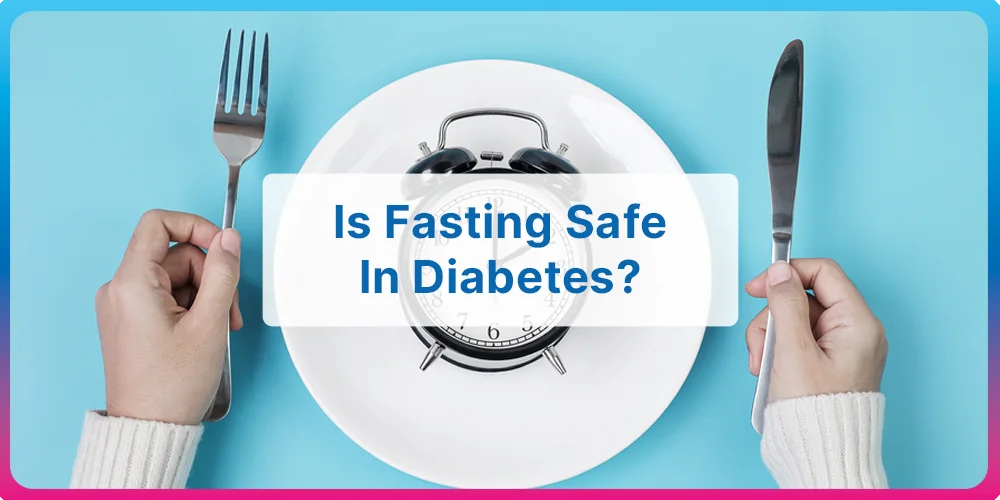Is Fasting Safe If You Have Diabetes?

Fasting is a deeply personal and often spiritual decision. But if you’re living with diabetes, it’s important to pause and ask: Is fasting safe for me?
For people with diabetes, fasting isn’t as simple as skipping a meal or two. It brings along questions like:
- Will fasting cause my sugar levels to drop?
- Can I manage without food or water for long hours?
- Is it even safe to fast with diabetes?
Let’s explore whether fasting and diabetes can go hand in hand.
What is Fasting?
Fasting means voluntarily going without food and sometimes even water, for a specific period. It can last a few hours or extend to an entire day or more, depending on religious or personal beliefs.
In India, fasting is commonly practised either for health (therapeutic) or spiritual (religious) reasons.
1. Therapeutic Fasting
This involves fasting for health benefits like weight loss, detox, or improved metabolism. It may activate the body’s fat-burning mode and help reduce inflammation. Some people with diabetes use this under medical supervision as part of lifestyle changes.
2. Religious Fasting
Whether it’s Navratri, Ramzan, or Ekadashi, religious fasting involves abstaining from food or specific types of food as a spiritual practice. But for someone with diabetes, this needs special planning and precautions.
Now, before we move ahead, a quick piece a info for you. Just in case you are looking for expert nutritionist made diet plans, do contact us. Our team of super nutritionist will help you understand what’s best for your current health condition and how how you can incorporate it in your diet easily. Click below.
Is Fasting Safe for People with Diabetes?
That depends entirely on your health condition and medical history.
If you have diabetes and are considering a fast, even for a single day, the most important step is to consult your doctor first.
Your doctor will evaluate:
- Your current blood sugar levels
- Any medications you’re on (especially insulin)
- Risks of low or high blood sugar
- Any other medical conditions you may have
Only after this evaluation can you make an informed and safe decision about fasting.
| Never fast without medical approval if you’re on insulin or other blood sugar-lowering medicines. |
6 Fasting Guidelines for Diabetes You Should Follow
If you’ve received your doctor’s go-ahead, here are some guidelines to fast safely:
1. Get enough sleep
You must never compromise on your sleep. Poor sleep can spike your blood sugar. Ensure 7- 8 hours of rest to keep your levels stable.
2. Keep yourself hydrated:
You must include nimbu pani, coconut water, and buttermilk in your fast based on your religious practices. If you are not taking liquids while fasting, drink enough fluids before and after starting your fast.
3. Avoid taking excess tea and coffee
Drinking these beverages during, before and soon after the fast can dehydrate you and lead to loss of essential minerals (which is especially dangerous during fasting hours).
4. Break your fast with sugar-free drinks:
Avoid eating oily and deep-fried food like puri or pakoras. Instead, you can opt for leafy vegetables, fruits (in moderation), dry fruits, boiled or sautéed veggies and lean meat based on your religious beliefs.
5. Avoid the three S – salty, spicy, and sugary foods
- Sugary food can cause a spike in blood sugar levels.
- Salty food can affect blood pressure levels and make you feel thirsty.
- Spicy food can cause heartburn and discomfort.
6. Monitor your blood sugar levels:
Check your levels:
- Before starting the fast
- Midway through the day
- After breaking the fast
If you notice dizziness, confusion, or weakness, break the fast immediately and consult your doctor.
Can Fasting Cause Low Blood Sugar?
Yes, if not done correctly. Here’s why:
Let us now understand the reasons why fasting may affect blood glucose levels.
1. Hormonal Changes
Fasting can affect hormones like insulin, glucagon and cortisol, which influence your blood sugar levels.
2. Risk of Low Blood Sugar:
If you’re on insulin or tablets, fasting may lower your blood sugar too much, leading to hypoglycaemia. This can cause:
- Dizziness
- Fatigue
- Irritability
- Confusion or even fainting
Can Fasting Cause High Blood Sugar Too?
Surprisingly, yes. Sometimes the stress of fasting or the wrong post-fast meals (like fried, sugary foods) can raise blood sugar levels. In extreme cases, it may trigger Diabetic Ketoacidosis (DKA), a medical emergency.
Signs to watch for:
- Nausea
- Vomiting
- Rapid breathing
- Sweet-smelling breath
- If you notice these, break the fast and seek medical help.
What to Eat During Fasting if You Have Diabetes?
Here are some diabetes-friendly options you can include (based on your faith’s guidelines):
- Low-Moderate GI fruits – Apple, pear, papaya
- Milk & milk products – Curd, paneer (unsweetened)
- Green leafy vegetables
- Hydrating fluids – Sugar-free lemonade, buttermilk
Fasting doesn’t have to be off-limits if you have diabetes, but it must be a planned decision.
Remember:
- Always consult your doctor first
- Eat smart and avoid sugary, salty, and spicy foods
- Stay hydrated and monitor sugar levels closely
- Don’t hesitate to break your fast if you feel unwell
How We At Fitterfly Can Help?
Fitterfly’s Diabetes Prime Programme offers expert guidance, customised meal plans, and regular monitoring to help you live well with diabetes — even while fasting.
Call us on 08068507599 for more details.
This blog provides general information for educational and informational purposes only and shouldn't be seen as professional advice.





















